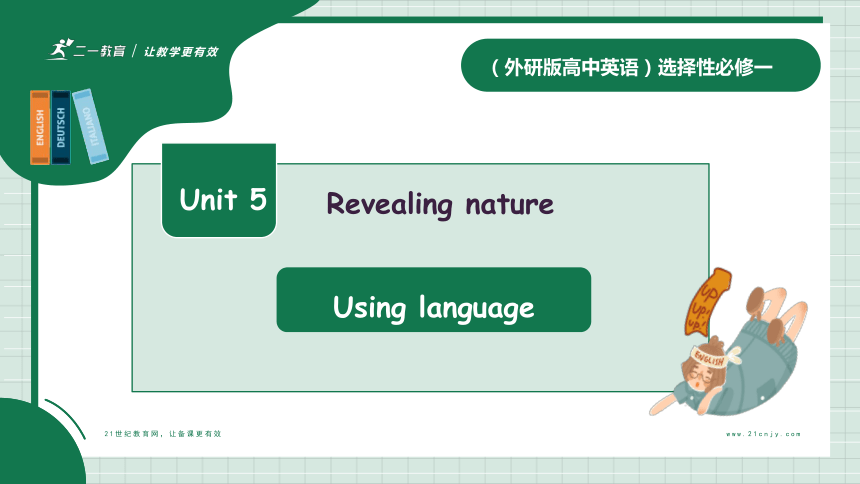(
课件网) (外研版高中英语)选择性必修一 Using language Revealing nature Unit 5 Revealing nature Learning objectives At the end of the class, students will be able to: Sort out words and expressions related to Biodiversity by reading; Describe the species using the related words and expressions;; 3. Improve the abilities to get and summarize the key information by listening; 4. Strengthen the awareness of protecting Biodiversity and develop the interest in exploring nature. . Using language What can you see from the video Every species is lovely and special! What species are mentioned and what is special about them Activity 1 Complete the passage with the correct form and answer the questions. is home to /so...that/length/weight survive/feed on /serve as /is native to The toughest species can survive temperatures from 150℃ to a below freezing -272 ℃. The largest animal species can grow up to 30 meters in length 130,000 kilos in weight viruses Bacteria [b k t ri ] So small that cannot see them with only eyes Special appearance habit function Mangroves Giant Tortoise Iguana They have a very special appearance, with comb-like spines on their back. They feed on leaves and grasses. They serve as the habitats for various birds and fish, and are very important to the ecosystem. bacteria benefits harms 2. Bacteria can help with digestion(消化). 1. Bacteria can be used to make cheese, yoghurt, vinegar(醋).. 3. Bacteria break down the dead, organic matter into nutrients. Bacteria can cause diseases or infection(传染病). Bacteria is used in food production. Discussion Activity 2 Listen to the podcast (播客)to complete the sheet and answer the questions. Jenny: This week, as part of our series on biodiversity, we are discussing_____. They are the _____ of life on Earth. Scientists believe they first emerged around_____! Josh: That's incredible! Jenny: But you can only see them with a microscope, as these living things are_____. We're talking about life at the level of the_____. 1. What’s the relationship between two people A. husband and wife B. partners C. classmates Where does this conversation probably take place in a online programme B. at home C. in a classroom What’s the main topic of the podcast microorganisms oldest form three and a half billion years ago very very small cell Tip2: ln a podcast, first listen out for the main topic. This is usually a statement or question at the very start of the podcast. We are discussing microorganisms Tip1:If you can’t recognize the word , try to note down how it sounds and try to work out the meaning from the context of the word. Listen to the introduction of cell and complete the sheet . Cells Every living thing is _____. They are like _____. In the human body there are about _____human cells and around _____bacteria cells. made up of cells thirty-nine trillion thirty trillion Tip 3: Pay attention to the strong pronunciation which is used to emphas ... ...

